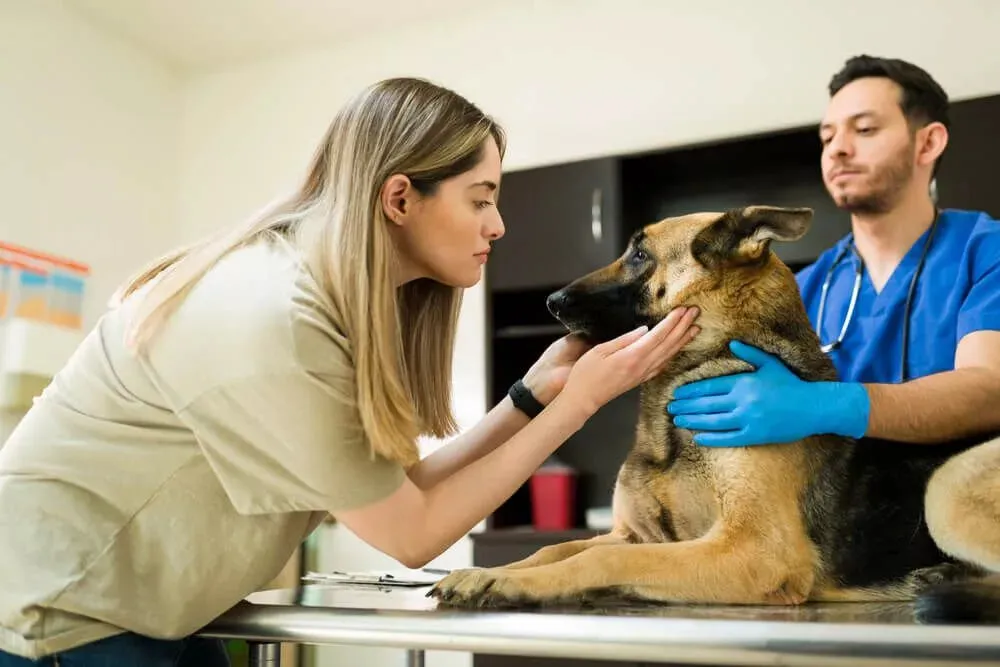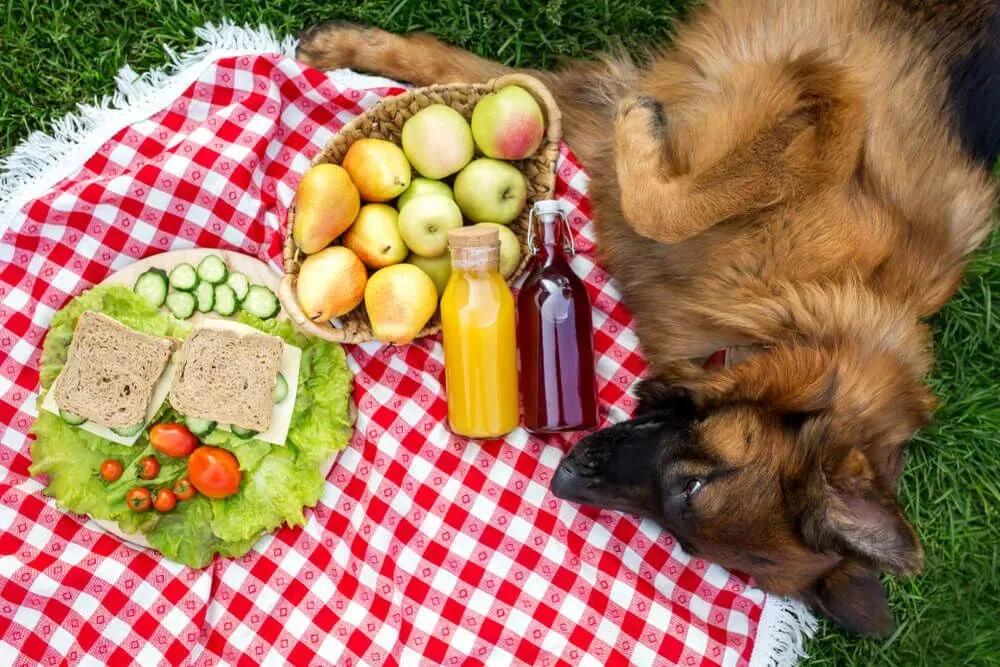It’s natural to want to share everything with our beloved canine companions, including our meals. The world of human food offers incredible variety, and just like us, our German Shepherds might enjoy a change from their regular kibble. However, when it comes to feeding your loyal German Shepherd human food, extreme caution is paramount. Many items perfectly safe for human consumption can cause severe digestive upset, allergic reactions, or even life-threatening toxicity in dogs. Understanding What Human Food Can German Shepherds Eat and, crucially, what they absolutely cannot, is vital for every responsible pet owner to prevent accidental ingestions and keep their furry friend healthy.
Understanding the Risks: Signs of Food Toxicity in Dogs
Accidental ingestion of toxic human foods is a common reason for emergency veterinary visits. Knowing the potential signs of food toxicity can help you act quickly and potentially save your German Shepherd’s life.
 German Shepherd dog appearing unwell, possibly with digestive upset, indicating symptoms of food toxicity.
German Shepherd dog appearing unwell, possibly with digestive upset, indicating symptoms of food toxicity.
If your German Shepherd has consumed something potentially harmful, you might observe signs such as:
- Vomiting
- Diarrhea
- Lethargy or unusual weakness
- Tremors or seizures
- Ataxia (loss of coordination) or wobbly episodes
- Increased thirst or urination
- Loss of appetite
As soon as you suspect your German Shepherd has eaten a toxic substance, it’s imperative to contact a veterinarian immediately for advice. Useful helplines, like the Pet Poisons Helpline, can also provide guidance on whether the ingested item is toxic, what symptoms to monitor, and the necessary next steps. Depending on the situation, your vet might advise you to induce vomiting or monitor your dog at home for any developing side effects. For general concerns about specific breeds, understanding what can French Bulldogs not eat can also offer insights into how different breeds might react to certain foods.
Toxic Human Foods German Shepherds Must Avoid
A truly toxic food is one that can cause significant harm to internal organs, even in small amounts. These foods should never be fed to your German Shepherd.
Alcohol
Alcohol toxicity in dogs can lead to vomiting, diarrhea, lack of coordination, excessive salivation, and increased thirst. In severe cases, alcohol can cause liver damage, just as it does in humans. During parties or gatherings, ensure alcoholic beverages are kept out of your dog’s reach to prevent accidental ingestion.
Garlic, Onions, and Chives
All forms of garlic, onions, and chives – whether raw, cooked, or powdered (all members of the Allium family) – are highly toxic to dogs. They damage red blood cells, which can impair oxygen-carrying capacity and lead to hemolytic anemia. Ingestion often causes inflammation of the stomach and intestines, resulting in vomiting, nausea, and reflux. These are common ingredients in many human sauces and cooked dishes, so always check labels before sharing leftovers. When considering what meat should you never feed your dog, remember that processed meats often contain these toxic seasonings.
Xylitol
Xylitol is an artificial sweetener commonly found in sugar-free gum, candies, certain brands of peanut butter, toothpaste, and baked goods. Even small amounts of xylitol can cause a rapid and dangerous drop in blood sugar levels in dogs, leading to weakness, collapse, and potentially seizures. It’s crucial to check ingredient labels carefully before offering any human food or treat containing this sweetener.
Caffeine
Caffeine, present in teas, coffees, energy drinks, and chocolate, acts as a neurological stimulant in dogs. Ingestion can lead to an increased heart rate, restlessness, hyperactivity, vomiting, and diarrhea. Large amounts of caffeine can result in liver damage if not promptly treated.
Grapes, Raisins, and Sultanas
The exact mechanism of toxicity from grapes, raisins, and sultanas remains unknown, but we do know they can cause permanent, irreversible kidney damage, which may not be apparent until it’s too late. This can even be fatal in extreme instances. Worryingly, there is no known toxic dose; even a single grape may be enough to cause adverse reactions in some dogs. Any ingestion of grapes, raisins, or sultanas should be treated as an emergency.
Dangerous Human Foods That Can Harm Your German Shepherd
Beyond truly toxic items, some human foods pose mechanical dangers or can cause severe digestive upset in German Shepherds, making them unsafe to share.
 German Shepherd dog curiously looking at a piece of corn on the cob, highlighting the dangers of certain human foods.
German Shepherd dog curiously looking at a piece of corn on the cob, highlighting the dangers of certain human foods.
Corn on the Cob
While cooked corn kernels are safe in moderation, corn on the cob is extremely dangerous for your German Shepherd. If eaten whole, the cob can cause a serious obstruction in the stomach or intestines, often requiring emergency surgery for removal.
Yeast Bread Dough
Raw bread dough containing yeast can be hazardous to dogs. If ingested, the dough continues to rise and expand in the stomach, leading to bloating, severe discomfort, vomiting, diarrhea, and in rare cases, even obstructions. Additionally, the yeast ferments, producing alcohol, which can lead to alcohol toxicity.
Meat on the Bone
While lean meat is generally healthy, feeding your German Shepherd meat still attached to bones, such as chicken wings or ribs, carries significant risks. Small bones can splinter and cause internal lacerations or perforations of the digestive tract. Larger rib bones can become lodged, leading to obstructions that necessitate surgical removal. It’s generally safer to remove all bones before offering cooked meat. If your dog suffers from specific health issues, such as pancreatitis, it’s also important to know what should a dog with pancreatitis not eat.
Safe Human Foods German Shepherds Can Enjoy (In Moderation)
Fortunately, there are many human foods that German Shepherds can safely enjoy as occasional treats, provided they are prepared correctly and offered in moderation. These items should never replace a balanced commercial dog food diet.
Cooked Lean Meats
Plain, cooked, boneless, and skinless meats like chicken, beef, or lamb are excellent sources of protein. Ensure they are free from any seasonings, onions, garlic, or excessive fats. Always cook thoroughly to eliminate pathogens.
Cooked Grains
Small amounts of cooked white or brown rice and plain pasta (without sauce or seasonings) can be safe additions to your German Shepherd’s diet. These can be particularly helpful for upset stomachs.
Cottage Cheese and Plain Yogurt
Small servings of plain cottage cheese or plain, unsweetened yogurt can be good sources of calcium and protein. However, many dogs are lactose intolerant, so introduce these gradually and watch for any signs of digestive upset like diarrhea. A small amount as an occasional treat is usually fine.
Cooked Eggs
Plain, cooked eggs (scrambled, boiled, or fried without oil/butter) are a nutritious treat. They provide protein and essential amino acids.
Certain Fruits and Vegetables
Many fruits and vegetables are safe and healthy snacks for German Shepherds. Examples include:
- Carrots: Great for dental health and a good source of vitamins.
- Apples: (without seeds and core) Provide fiber and vitamins.
- Green Beans: A low-calorie, crunchy treat.
- Blueberries: Packed with antioxidants.
Always wash produce thoroughly and remove any pits, seeds, or stems, as some parts of fruits can be toxic.
General Feeding Guidelines and Prevention
When considering what human food can German Shepherds eat, always remember that moderation is key. Even safe foods can cause digestive upset if given in large quantities or too frequently. Always introduce new foods slowly and in small amounts to monitor your dog’s reaction. If you’re unsure about a specific food, err on the side of caution and consult your veterinarian.
Preventing accidental snacking is also crucial. Keep pantry doors locked, use snap-lock bins for trash, and educate guests that feeding your German Shepherd is strictly off-limits without your explicit permission. For young puppies, the diet is even more critical, and understanding what should a 1-month-old puppy eat highlights their specialized nutritional needs.
Conclusion
Understanding what human food can German Shepherds eat is fundamental to ensuring their health and safety. While providing variety can be enjoyable for your furry friend, the potential dangers of certain human foods cannot be overstated. By being aware of both toxic and dangerous items, and by offering safe foods only in moderation and properly prepared, you can prevent accidents and contribute to your German Shepherd’s overall well-being. Always prioritize your veterinarian’s advice for any dietary concerns, as they can provide personalized guidance for your dog’s specific health needs.
FAQ
What human food can German Shepherds eat?
Examples of safe human foods for German Shepherds include small amounts of cooked lean meats like chicken or beef (boneless, skinless, unseasoned), cooked rice or pasta, plain cottage cheese, plain yogurt, cooked eggs, and certain fruits and vegetables such as carrots or apples (without seeds). Always feed in small amounts and ensure the food is safe before offering it.
What fruits can German Shepherds not eat?
German Shepherds should not eat grapes, raisins, rhubarb, unripe tomatoes, or stone fruits such as cherries, peaches, and plums, as their pits can be toxic and pose a choking hazard.
Can a German Shepherd eat ice cream?
Many dogs are lactose intolerant, so ice cream can cause stomach upset, leading to vomiting and diarrhea. A very small amount as an occasional treat might be acceptable for some dogs, but large or frequent servings should be avoided.
Can German Shepherds eat potatoes?
Never feed your dog raw potato, as it contains Solanine, a compound toxic to dogs. However, baked or boiled plain potato, without seasonings or butter, is generally safe to feed in small amounts.
